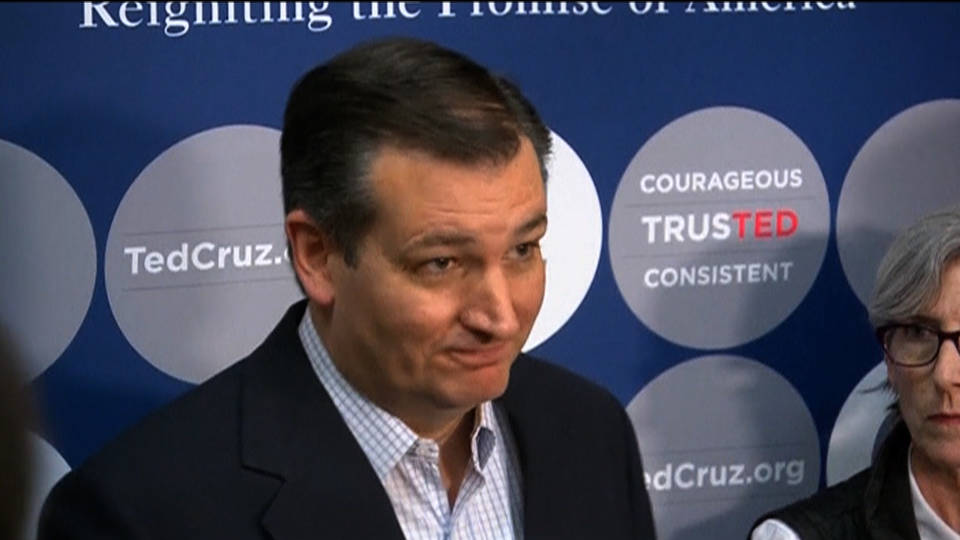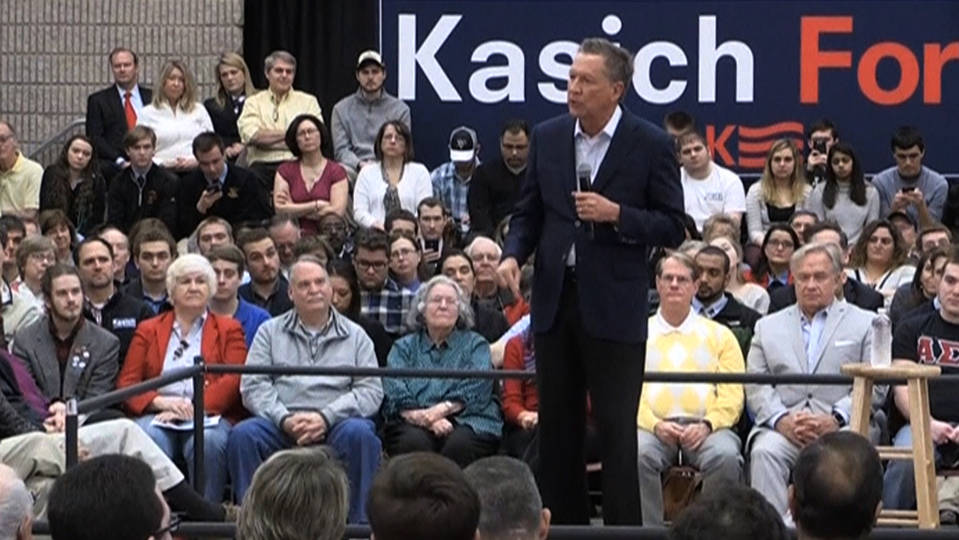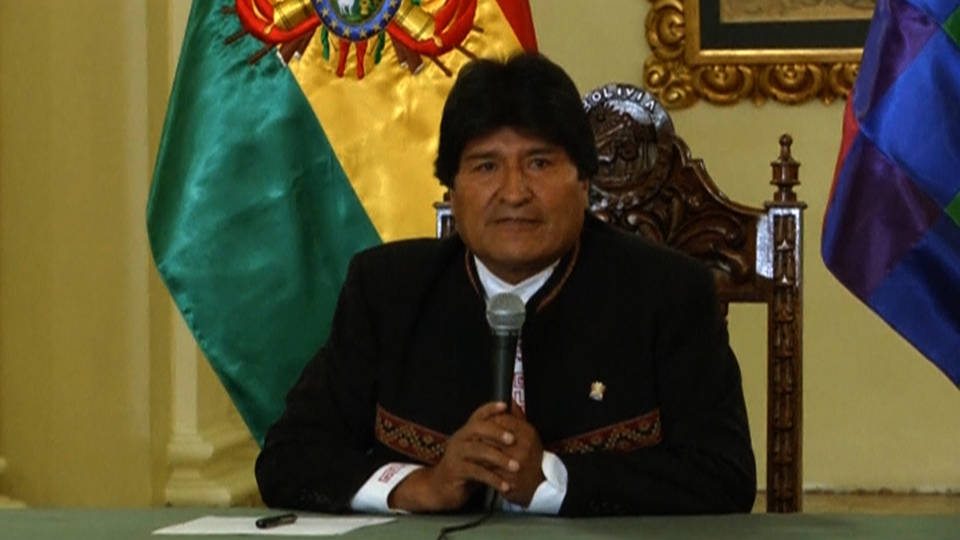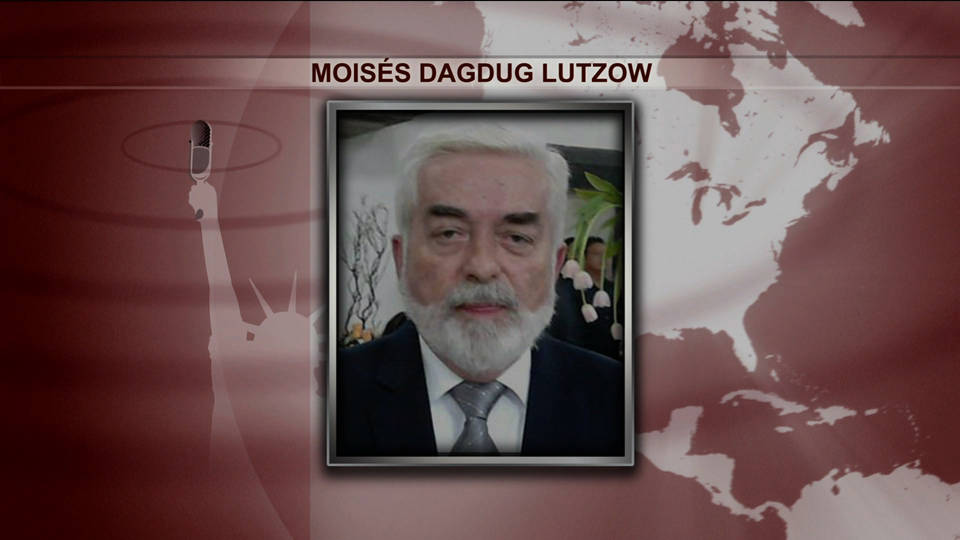democracynow.org
Stories:

"GOP–Get Out of My Panties": Former OH State Sen. Nina Turner on Gov. Kasich's Anti-Choice Record
Republican presidential hopeful and Ohio Governor John Kasich on Sunday signed a bill that aims to strip funding from Planned Parenthood in the state. Although the organization isn’t explicitly named in the legislation, the law prohibits the state health department from contracting with organizations that provide any abortions—or work with those who do. The law will strip Planned Parenthood of $1.3 million in state and federal assistance. Planned Parenthood funds support a number of services, including breast cancer screenings, STD testing and programs working to prevent violence against women. State and federal laws already prohibit taxpayer dollars from going to fund abortions, with exceptions for rape, incest and the life of the mother. We speak with former Ohio state Senator Nina Turner, who once wore a T-shirt opposing anti-choice policies that read "GOP—Get Out of My Panties." "I’m just sick and tired of Republicans across this country talking about smaller government, but they want government to be big enough to fit into a woman’s womb," Turner says.
TRANSCRIPT
This is a rush transcript. Copy may not be in its final form.
AMY GOODMAN: We’re on the road in Westerville, Ohio, just outside the capital, Columbus. We’re broadcasting from OTV—that’s Otterbein Television—at Otterbein University.
Republican presidential hopeful and Ohio Governor John Kasich Sunday signed a bill that strips funding from Planned Parenthood in the state. Although the organization isn’t explicitly named in the legislation, the law prohibits the state health department from contracting with organizations that provide any abortions—or work with those who do. The law will strip Planned Parenthood of $1.3 million in state and federal assistance. Planned Parenthood funds a number of services, including breast cancer screenings, STD testing and programs working to prevent violence against women. State and federal laws already prohibit taxpayer dollars from going to fund abortions, with exceptions for rape, incest and the life of the mother.
Speaking at a campaign rally in Virginia Monday, Governor Kasich was asked about defunding Planned Parenthood.
STUDENT: As a future nurse, I recognize that primary care and prevention is the most cost-effective healthcare for our nation, but that we are also facing an STD epidemic. Planned Parenthood’s largest percentages of services are towards STD treatment and prevention. Could you please tell me the economic and public health benefit of defunding this legislation that has treated over 4 million people seeking STD services just this past year?
GOV. JOHN KASICH: Yeah, let me—look, I think, unfortunately, for however those who support feel, I think it’s discredited itself. But I want to make one thing clear to you. Are you kidding me? We have robust women’s health funding in Ohio. We consider women’s health to be critical. But you don’t have to be captive of delivering it through an organization that, frankly, has largely discredited itself, OK?
AMY GOODMAN: Ohio Governor Kasich, speaking Monday at a campaign rally in Virginia. Planned Parenthood President Cecile Richards denounced the bill, saying, quote, "This legislation will have devastating consequences for women across Ohio. John Kasich is proudly eliminating care for expectant mothers and newborns; he is leaving [thousands] without vital STD and HIV testing, slashing a program to fight domestic violence, and cutting access to essential, basic health care," Richards said.
To talk more about this, we’re going to Cleveland, Ohio, to talk to Nina Turner, former Ohio state senator.
Welcome back to Democracy Now!, Nina Turner. Can you talk about the governor’s decision to sign this legislation and how it made it through, well, your former Legislature, the Ohio state Legislature?
NINA TURNER: Thanks, Amy, and so glad that you are in Ohio.
Certainly, the governor and I have done our share of battling. I do not agree with the defunding of Planned Parenthood. As a matter of fact, I’m a national board member on Planned Parenthood. And as the young person whose voice I heard laid out all of the wonderful things that Planned Parenthood does, it just really doesn’t make sense. You know, the governor is pro-life, and we know that Republicans across this country, not just in the great state of Ohio, have been pushing to chip away at Roe v. Wade. So, it should come as no surprise that the governor would sign that bill.
What we need to do, though, however, because women’s health and their families’ health is in jeopardy—and Planned Parenthood, only 3 percent of what they do, Amy, we know, has anything to do with abortion. And as you laid out in your opening, that federal—that tax dollars, federal state funding, cannot be used—public funds cannot be used for that. But this is really about voting and making sure that people get out to vote in nonpresidential election years so that we have a Legislature full of people who have our ideas and thoughts. This is not the first time that the Ohio Legislature has tried to strip away funding from Planned Parenthood. And so, unfortunately, this time, they were able to do it, and the governor did sign it. And I’m not surprised about that.
AMY GOODMAN: Can you talk about the governor’s timing? You had the South Carolina Republican primary on Saturday. There was discussion about whether he would sign it right before. He didn’t, but he did sign it right after. And is it unusual to sign on a Sunday?
NINA TURNER: Well, not necessarily. I mean, the governor can decide when to sign, you know, so I’m not surprised by that either. In all my time in the Legislature, you know, stranger things have happened. I mean, again, the governor is pro-life, and for him, this Planned Parenthood bill is really very much in line with what he has talked about, although I vehemently disagree with him on Planned Parenthood. I disagree with my Republican colleagues in the Legislature and Republicans all across this country. What is really putting a woman’s right to have an abortion—because some of us are afraid to say the "A" word—it’s not just the Ohio Legislature, it’s not just Governor Kasich, but it is really an attack, an affront, against the great work of Planned Parenthood all across this country and people’s refusal to understand that over 97 percent of what Planned Parenthood does is to provide preventative healthcare. So I am disappointed, but I am not surprised. And as you know, when you talked about that T-shirt that I wore a few years ago, certainly the governor and I disagree on Planned Parenthood.
AMY GOODMAN: Talk about the T-shirt that you wore. Was this when you were a state legislator?
NINA TURNER: Yes, it was. And it was really a pushback against not—you know, the heartbeat bill that was introduced in the Legislature that would limit a woman’s access to abortion. You know, I’m just sick and tired of Republicans across this country talking about smaller government, but they want government to be big enough to fit into a woman’s womb. And so, that "GOP—Get Out of My Panties" T-shirt was a pushback against that kind of stuff.
It just makes no sense, with everything that people need in this country. We have almost 100 million folks in this nation who are either in poverty or on the brink of being in poverty. Seventy percent of those 100 million are women and children. And for people in the Legislature to be focusing in on Planned Parenthood or to be focusing in on women’s healthcare choices really makes no sense, when what we should be doing is putting people back to work, making sure that we make the requisite investments to educate our children, rebuilding our infrastructure. But yet and still, we have members of the Legislature all across this country who are not only cutting funds to Planned Parenthood, but really are trying to dismantle Roe v. Wade.
AMY GOODMAN: We’re also seeing a wave of interesting bills being introduced in several states, calling for waiting periods for men to get Viagra. Now, you introduced legislation like this, right, when you are an Ohio state senator, Nina Turner? Can you talk about it?
NINA TURNER: I did, Amy. I would like to think that I got that started. You know, again, just really concerned about what my male legislators were doing in Ohio, and since they have decided that the best way to utilize the taxpayers’ time or the voters’ time was to try to regulate women’s healthcare, I decided I needed to do my job and regulate men’s healthcare, as well. And as we know, according to the FDA, those pills do cause some problems for men, and so we’ve got to look out for men in this country, because they can’t make decisions about their own healthcare without government telling them what to do.
And I did introduce an erectile dysfunction bill. And in my bill, a man would have to get a signed affidavit by his significant other attesting to the fact that he has problems, have a psychiatric test, do a cardiac stress test, because, Amy, we’ve got to look out for men. And that’s really—that was the purpose of that bill. And it is rooted in scientific, medical evidence that those pills can cause problems with the heart and priapism and other types of problems for men. And so, we’ve got to look out for them, because they can’t make a decision without government.
AMY GOODMAN: Finally, under Governor Kasich, roughly half of the abortion clinics in Ohio have closed, is that right? How are women getting access to reproductive healthcare, that’s legal in this country, Nina Turner?
NINA TURNER: Yeah, well, Amy, you hit the—it is legal. It’s getting harder and harder in our state for women to have that access. And so, again, the governor and I disagree on this, and so I want to make that plain. And the reason why I’m saying that is because the governor and I do have a relationship. We are friends. We have done some great work together—most recently, the task force on Ohio—the task force on community and police relations. And so, we can work together and do great things, and that is vitally important—and certainly, given all of the shootings that have happened, the ability to bridge the gap between the community and police, particularly the African-American community.
But on a woman’s right to choose, the governor and I are strictly on opposite sides, and any—opposite sides. And anytime you have government getting itself in the way of healthcare access, we have a problem. And so, Amy, ad nauseam, I am going to continue to say that this is really about the ballot box and that we cannot nation-build every four years. We nation-build every single year there’s an election. And so, the types of people that we elect to the Legislature, to the Governor’s Mansion, to the Secretary of State’s Office—you name it—will have an impact on our lives. And so, if we want to have legislatures that will not push us back in time, then we have to get out to vote for people who understand that Roe v. Wade, number one, is the law of the land, and, number two, a woman should have the right to decide her own reproductive health needs, period.
AMY GOODMAN: Nina Turner, we’re going to ask you to stay with us after break, because you recently switched your support from Democratic presidential candidate Hillary Clinton to Vermont Senator Bernie Sanders. We want to find out why. Nina Turner is former Ohio state senator, a national surrogate for Senator Bernie Sanders. Stay with us.
... Read More →
Nina Turner on Switching from Clinton to Sanders: He's Been a "Constant Champion" of Civil Rights
As Hillary Clinton and Bernie Sanders campaign ahead of the South Carolina primary, we speak to former Ohio state Senator Nina Turner. She made headlines in November when she switched her support from Clinton to Sanders. Turner is now a national surrogate for the Vermont senator.
TRANSCRIPT
This is a rush transcript. Copy may not be in its final form.
AMY GOODMAN: Well, while you support Governor Kasich in this issue of dealing with police-community relations, you’re throwing your support on the Democratic side. You originally said you were going to support Hillary Clinton, but now you’ve switched to Bernie Sanders. Why?
NINA TURNER: Well, Amy, I know people want to focus on the so-called switch. But for me, in 2014, I was asked to help ready for Hillary, and that’s exactly what I did. But when it came time to endorse, I have endorsed Senator Bernie Sanders. He has the type of heart-soul agreement that I believe that we need in this country. He has been a constant champion for civil rights, women’s rights, voting rights. His plan to make sure that we have universal healthcare in this nation, as a right and not a privilege, really speaks to me. We have 29 million of our sisters and brothers in this country who still do not have healthcare, and even more who are underinsured. When he talks about directing our public dollar and our political will, or directing our public will, I should say, towards making sure that we change the model in this country to a pre-K-to-college model, that speaks to me, Amy, especially because I am a first-generation college graduate and I understand, from a personal perspective, the power of higher education to help somebody change the trajectory of their life. I grew up in a single-parent household. My parents got married young, and it didn’t work out. And my mother died at the young age of 42 years old with her dreams deferred. So, from the healthcare perspective, from the college perspective, what Senator Sanders unapologetically is standing up for speaks to me.
And so, yes, I am wholeheartedly supporting him and his efforts for a political revolution in this country. The system is rigged. Money is now speech. I mean, just alone, the Koch brothers, just using them as one example, have committed to spending almost a billion dollars in this election cycle, Amy. It makes no sense that the voices of everyday people, like you, me, your viewers and listeners, are being drowned out by money. Senator Sanders is going head up on that. He talks about how the working poor and the middle class in this country, they deserve voice, and they also deserve to live a good life. So, Senator Sanders is speaking the heart-soul agreement language.
AMY GOODMAN: I was just reading an article by Irin Carmon for NBC News, "Democratic Primary Finds Black Feminists Conflicted," talking about Sanders and Clinton really going after the vote of African-American women. In Nevada, African Americans overwhelmingly voted for Secretary Clinton. The Latino vote, it’s believed, in the Nevada caucus went to Sanders. And now, of course, moving on to South Carolina. How does it feel to be so sought after? And did both sides court you, Nina Turner?
NINA TURNER: Well, I feel, Amy, that the vote of African-American women have always been important. But what we saw in 2008 and 2012, in particular, is that that vote, African-American women, were the highest voting bloc in the country, 9 million strong. When black women vote, our families vote with us, usually. And so, we have always been important. The fact that the political types are just catching up with that causes me pause, but it is vitally important.
And the thing that Senator Sanders definitely understands, coming from Vermont—as you know, his state is not as demographically diverse, but he has been fighting the battles of civil rights for a very long time. He didn’t just come to this. He talks about the five violences against black and brown people being political, physical, legal, economic and environmental, and the things that he wants to do to change this. When it comes to the African-American community, Senator Sanders fully understands that he has to earn the vote, he does not own the vote. And for a lot of folks in the African-American community, the Clinton brand is a known quantity, so Senator Sanders is going to have to fight harder. But make no mistake about it: He is working throughout this country, all 50 states, to earn the votes, not only of African Americans and our Hispanic brothers and sisters, but all voters in this country.
But you asked me how does it feel. It feels good, but it is a long time coming. The votes of African Americans have always been important. And at times, my own party has forgotten that. And, Amy, as you know about me, I am a straight shooter, no matter what. It doesn’t matter to me whether I’m talking about my party or the Republican Party. It is vitally important that nobody’s vote is taken for granted. And for too long in this country, it has been taken for granted by Democrats.
AMY GOODMAN: I wanted to bring another person into this conversation as we talk to former Ohio state Senator Nina Turner: independent journalist Harvey Wasserman, who’s based here in Columbus, Ohio, in Ohio’s capital. You’ve written a piece about Bernie Sanders and, overall, about military spending, Harvey. Can you talk about your concerns?
HARVEY WASSERMAN: Well, Bernie’s wonderful programs have been attacked, of course, because allegedly they cost too much money. And no one has really, in this campaign—and Bernie may have mentioned it here and there—talked about the fact that we’re not talking about cutting the defense budget, cutting the military budget. There are a trillion dollars earmarked right now to upgrade our nuclear weapons program. Why are we upgrading it? Why don’t we just get rid of these nuclear weapons? There’s a call out there to build 12 new Ohio-class nuclear submarines at 8 billion bucks apiece or more. Why would we even think of doing that? Bernie has wonderful social programs laid out there. The money to pay for them should not come from raising taxes; it should be coming from cutting the military budget. And we have laid that out in the piece. We think Bernie needs to talk about that a little more strongly.
AMY GOODMAN: Your thoughts on this, Nina Turner?
NINA TURNER: Well, Amy, unfortunately, my earpiece was out at the time, but I think I caught the tail end of what he’s talking about in terms of taxes. Certainly, Senator Sanders has a plan to—it is a fallacy that folks are putting out there that Senator Sanders is going to raise taxes on the middle class. Every program that the senator has put forward, people can go to BernieSanders.com and see how he plans to pay for those. I will use the college plan, college for all, tuition-free college for all, as an example. The senator wants to put a speculation—or, a tax on Wall Street speculation, again, asking Wall Street to help Main Street, as we did when we bailed them out. You know, folks don’t have a problem with us investing our money to help the wealthiest people in this country—corporate welfare, if you will—but folks seem to have a problem with us investing our money in the working poor and middle class in this country.
Where there is a will, there is a way. And we can get this done. If we can go to the moon, we can find a way to have universal healthcare as a right in this country. If women can get the right to vote, we can find a way in this country to fund, to fully fund, the—similarly that we have a K-through-12 model, to take that model that no longer works in the 21st century, to a pre-K-to-college model. Where there is a will, there is a way. And making those kinds of investments in the American people is the right thing to do. We cannot go from President Obama’s "Yes, we can" to "No, we can’t." And that is what a lot of folks are talking about, Amy, and I just reject it flat out.
AMY GOODMAN: Well, Nina Turner, what Harvey Wasserman was saying is that the money should come from military budgets, and he is finding that Bernie Sanders, in this primary, is not talking very much about cutting military spending, as none of the other candidates are.
NINA TURNER: Oh, well, thank you for that, Amy. As I said, the first part, I—
HARVEY WASSERMAN: Well, Amy—
NINA TURNER: I didn’t hear the first part of what he had to say.
AMY GOODMAN: Right.
NINA TURNER: And so, all I heard about was the taxes, and a lot of people have been promoting that.
AMY GOODMAN: Right.
NINA TURNER: Yeah.
AMY GOODMAN: Yes, Harvey?
HARVEY WASSERMAN: Well, you know, the problem is that the country is being roiled by terror, threats of terror and things like that, which we always see, that goes all—all through time, governments terrorize people with the idea of a foreign threat. The money that’s spent, being spent on our nuclear weapons arsenal, on our Ohio-class submarines, on 900 military bases around the world in 175 different countries, that makes things worse. And what we really need to do now is face the 800-pound gorilla in the room here and get this money out of the military. And I’m sure that’s Bernie’s inclination. The question is: When will that become part of the dialogue in these primaries and, of course, in the general election? How can you talk about raising taxes to pay for social programs, when all of this money is being thrown down the military toilet?
AMY GOODMAN: Nina Turner, I want to thank you for being with us, joining us from another part of Ohio. Did you want to respond to what Harvey Wasserman said on that issue of why—
NINA TURNER: No, I—no, I’m—yeah, thank you for that, Amy. Yes, my earpiece is back. I certainly understand exactly what Harvey is saying, and that will be for the senator to decide. But I really—his point that’s being made about this fear factor, that people are being amped up, both on the Republican and the Democratic side, if you will, about this foreign threat—any president of the United States of America is going to be fully capable of protecting this country from any threat, both domestic and foreign. But what I find to be the biggest threat is the income inequality that is faced in this country, that we need to do more about. And Senator Sanders is firmly talking about that. So, Harvey, thank you for your point well taken, and I will definitely take that back to Senator Sanders. And, Amy, thank you so much. It was a pleasure to join you this morning.
AMY GOODMAN: Thank you very much, Nina Turner, former Ohio state senator, speaking to us from Cleveland.
... Read More →
Could the 2016 Election Be Stolen with Help from Electronic Voting Machines?
Harvey Wasserman of Columbus, Ohio, has been a vocal critic of electronic voting machines. He co-wrote the book, "What Happened in Ohio: A Documentary Record of Theft and Fraud in the 2004 Election." His upcoming book is titled "The Strip & Flip Selection of 2016: Five Jim Crows & Electronic Election Theft." We talk to him about his concerns for the upcoming presidential race.
TRANSCRIPT
This is a rush transcript. Copy may not be in its final form.
AMY GOODMAN: We’re in Westerville, Ohio, just outside Columbus. We’re at Otterbein University, where I’ll be teaching some classes today, or, let’s say, talking with students. We’re at OTV, which is Otterbein Television. And, Harvey Wasserman, I wanted to talk to you now about voting machines—
HARVEY WASSERMAN: Right.
AMY GOODMAN: —and your concern over the years that electronic voting could be used to steal elections. Are you still concerned about this?
HARVEY WASSERMAN: Well, electronic voting was used to steal the presidential election right here in Ohio in 2004. John Kerry was the rightful winner in 2004 over George W. Bush. The secretary of state at the time, J. Kenneth Blackwell, and the governor, Robert Taft, used their power of electronic vote count to flip the vote to George W. Bush from John Kerry.
AMY GOODMAN: How do you know this?
HARVEY WASSERMAN: We watched it—I grew up here, Amy. We watched it, totally, right up close and personal. We did the accounting. I work with a political scientist named Bob Fitrakis. We’re about to come out with another book, The Strip & Flip of the 2016 Selection. They are stripping the voter rolls—and Greg Palast, the great investigative reporter, is doing great on this—removing African Americans, Hispanics, people who might incline to vote progressive, and they—so that—in 2004, they stripped 300,000 people from the voter rolls here in the urban areas. Bush only won by less than 120 [thousand].
And this year, about 80 percent of the vote nationally will be cast on electronic voting machines. There is no verifiability. In six key swing states—Florida, North Carolina, Ohio, Michigan, Iowa and Arizona—you have Republican governors and Republican secretaries of state, and no method of verifying the electronic vote count. At midnight or whenever it is on election night, those two guys can go in there with an IT person and flip the outcome of an electronically counted vote within about 60 seconds. So all this millions and millions of dollars, people out campaigning and so on, can be negated by an electronic vote flip late at night on election night, and there is no way to verify what’s happened.
AMY GOODMAN: They didn’t do this with President Obama in 2008.
HARVEY WASSERMAN: They did. He had too many votes; he was too far out. They couldn’t—it would have taken them too many, to flip too many states. [inaudible] believe Obama won by well over 10 million votes. The last—the final vote count was in—official, was in 7 or 8 million.
AMY GOODMAN: But what gives you this idea?
HARVEY WASSERMAN: Because we’ve seen it happen. When you compare exit polls, which are generally accurate to within 1 percent, with the electronic outcome, there are huge variations. And we have documented many dozens of different things that they have done over the years to flip electronic votes.
AMY GOODMAN: How does e-voting, electronic voting, work? And who controls the controls on it?
HARVEY WASSERMAN: Well, that’s the key. The electronic voting machines are owned by private corporations, which are Republican in orientation, generally. And the courts have ruled that the source code on these electronic voting machines is proprietary. So, even the governments that buy or lease these machines have no access to a final verification process. Even Ronald Reagan said, "Trust, but verify." And we know that the vote count was flipped in 2004. We know it was flipped in Volusia County in 2000.
AMY GOODMAN: Where is Volusia County?
HARVEY WASSERMAN: In Florida, when Al Gore basically was the rightful winner, and George W. Bush won the election. I mean, the only great—
AMY GOODMAN: And they were electronic voting machines?
HARVEY WASSERMAN: In Volusia County, they were, yes. In the southern part of Florida, they used butterfly ballots, as you’ll recall. The only good thing we can say about George W. Bush is the American people never actually elected him president. And we’re looking now at 2016, at an election that will be very easily flipped, in those six key swing states and elsewhere.
AMY GOODMAN: What do you think is the answer?
HARVEY WASSERMAN: We have to have universal, hand-counted paper ballots. And Bernie Sanders has endorsed that. We have to have automatic voter registration, where people can monitor the registration rolls, because people are being stripped from the registration rolls, mostly, of course, African-American and Hispanic. But this year, we’re not going to get that. And this year, it’s going to be very, very difficult, in a close election, to monitor exactly what happens, because these are black boxes. We have a wonderful actress named Bev Harris, who’s been working with Greg Palast and others, who has shown, in black box voting, that the public has no real access, no verification process for the electronic votes. And so we’re going through this huge charade here of a national campaign, primaries and then a general election, where hundreds of millions of dollars will be spent, and on election night, in 60 seconds, the actual outcome can be flipped electronically in key swing states with no verification whatsoever.
AMY GOODMAN: If there are electronic voting machines everywhere, which there are now, right?
HARVEY WASSERMAN: Pretty much, yes.
AMY GOODMAN: How do you think they can be protected, people can be sure that their vote is counted, that they cast, even using electronic voting machines?
HARVEY WASSERMAN: They can’t be. You cannot verify an electronic voting machine. They are privately owned by private corporations, and the proprietary software prevents the public from getting access to the actual vote count. We’re going into a national election, and not just the presidency, but Senate seats, House seats. We believe three Senate seats in 2014 were stolen—in North Carolina, Colorado and Alaska—that the Republicans do not have a legitimate 54-seat, or whatever it is, majority in the Senate. And this will happen again. It’s not just the presidency. And we’ve been—we have written seven books about this, Bob Fitrakis and I, from our experience here in Ohio in 2004. And again, we have a Republican governor, Republican secretary of state, no verifiability on the electronic vote count. It will be arbitrary, when push comes to shove, on—midnight, 1:00 on election night—what the outcome will be.
AMY GOODMAN: Why do you think just Republicans would do it?
HARVEY WASSERMAN: Oh, no, Democrats definitely do it. I have—we have strong questions about Rahm Emanuel being re-elected in Chicago, for example. We have no doubt that Scott Walker stole his re-election in Wisconsin.
AMY GOODMAN: Based on what?
HARVEY WASSERMAN: Based on the miraculous discovery of several thousand votes in a so-called glitched computer voting machine that gave him a victory where it was clearly a defeat. You know, this is stuff that’s been going on a long time. These methods were perfected more or less overseas by the CIA and other covert and overt operations. They came back. It started in 1988 with George H.W. Bush using electronic voting machines in New Hampshire to beat Bob Dole in the 1988 primary. And we have seen since then the use of electronic voting machines all across the country to flip elections after they have stripped the voter rolls. And, you know—
AMY GOODMAN: When you say "stripping the voter rolls," you mean?
HARVEY WASSERMAN: Yes, well, Greg Palast has reported on this. In Florida 2000, 90,000 mostly black and Hispanic voters were stripped out of the voter rolls before the election, in a vote count that was won by 600 votes. And in Ohio 2004, 300,000 voters in primarily urban areas were stripped off the voter rolls. People showed up to vote in the same precinct—as did I, by the way—they were—I was denied my absentee ballot, and we had a federal lawsuit on this, which we won and went nowhere after that.
But the reality is that we are voting in black boxes and that the governors and secretaries of state of these key swing states—but wherever you have a governor and secretary of state from the same party, be they Democrat or Republican, they have the power, under the electronic voting system, to flip the outcome of an election, with no verifiability, because the courts have ruled that these privately owned voting machines have proprietary software. It’s a nightmare. And it’s not democracy. I mean, Bernie Sanders has shown that the election—that the campaign finance is rigged, that the economy is rigged. Why wouldn’t they take the very small next step to rig the electronic voting machines?
AMY GOODMAN: Well, we’re going to leave it there for right now, Harvey Wasserman, independent journalist, longtime anti-nuclear activist. His recent article for the WorldBeyondWar.org is "Why the Deafening Silence on Cutting the Military Budget?" His upcoming book is called The Strip & Flip Selection of 2016: Five Jim Crows & Electronic Election Theft.
This is Democracy Now! We’re broadcasting from Ohio. When we come back, we’re going to look at private prisons here. Stay with us.
... Read More →
Prisons for Profit: Under Kasich, Ohio Becomes Laboratory for Privatizing Public Jails
Image Credit: "Out of Sight, Out of Mind"
Ohio holds the distinction of being the first state to sell off a public prison to a private corporation. This happened in 2011 when Governor John Kasich oversaw the sale of Lake Erie Correctional Institution to the Corrections Corporation of America. The sale was promoted as a way to save the state money, but according to the ACLU of Ohio, the plan largely backfired. We speak to Mike Brickner, senior policy director at the ACLU of Ohio. The group released a report and short documentary film called "Prisons for Profit."
TRANSCRIPT
This is a rush transcript. Copy may not be in its final form.
AMY GOODMAN: We’re broadcasting from Westerville, Ohio, from OTV. That’s Otterbein University Television. I’m Amy Goodman. Ohio holds the distinction of being the first state to sell off a public prison to a private corporation. This happened in 2011, when Ohio Governor John Kasich oversaw the sale of Lake Erie Correctional Institution to the CCA. That’s the Corrections Corporation of America. The sale was promoted as a way to save the state money, but according to the ACLU of Ohio, the plan largely backfired. The ACLU recently produced a short documentary titled Prisons for Profit. This is Conneaut City Councilman Neil LaRusch commenting on what happened after the Lake Erie Correctional Institution was sold.
COUNCILMEMBER NEIL LARUSCH: This prison grew by 300 in the first couple months. We took a tour of the prison shortly after the sale, and they were doubling bunks, and they were getting ready for this huge influx of people. And right then, you can see that there’s obviously going to be a problem with the limited number of corrections officers that you have out there compared with this huge and growing number of inmates that you have. So, did we think it was going to be a problem? Absolutely.
AMY GOODMAN: Prisons for Profit. Joining us now from Cleveland, Ohio, is Mike Brickner, senior policy director at the ACLU of Ohio. Can you talk about the report you put out, the report you’ve released on private prisons, and why Ohio is so central in this country?
MIKE BRICKNER: Good morning, Amy. Thanks for having me.
So, we were the first state in the country to sell a public prison to a private corporation, Corrections Corporation of America, under Governor Kasich’s first budget in 2011. And to quote candidate Trump, it has been nothing short of a disaster ever since then. And as Councilman LaRusch explained in the clip, a big reason for that is because the very first thing that CCA did was that they added more and more beds into the prison, making it dangerously overcrowded. And so, in the first several months that it was open, we saw that assaults within the prison, on both staff and prisoners, more than doubled. We saw drugs proliferate throughout the prison, and we had reports of people outside of the prison throwing duffel bags full of drugs over the fence so that prisoners could sell them inside without any sort of search or trying to stop that process.
And then we also saw where prisoners were living in terrible, squalid conditions, where state investigators were going into the prison and finding that many prisoners did not have access to running water and were doing things like using plastic bags to defecate in. But unfortunately, that’s the reality. When prisoners become dollar signs, these private corporations, they don’t have good conditions, they don’t invest in rehabilitation, they don’t invest in good staff. And we see it time and again where those prisons degenerate and become big public safety concerns.
AMY GOODMAN: Why was—is Ohio such a testing ground for private prisons?
MIKE BRICKNER: Well, when Governor Kasich first came into office, he was for privatization of just about everything, and prisons very quickly came into the crosshairs. And I think a lot of that was pushed by the large overincarceration problem we have here in the state of Ohio. We have the sixth-largest prison population in the country. Our prisons are at over 130 percent capacity. And I think Governor Kasich thought, "Well, if I privatize a few prisons, maybe I can save some money in the state budget."
But we know that that is absolutely the wrong way to go, that private prison companies have lobbyists that they can go and lobby for stricter criminal and immigration laws that will fill prisons, and that that’s in their interest, because, again, prisoners equal dollar signs for these companies. It is in their interest to have more people in prison, and they want people who are low-level and nonviolent, because those are the people that are easier for them to take care of and that they can make a greater profit on. And so, since we’ve introduced those prisons, those private prisons, here in the state, we’ve actually seen where our prison population has continued to grow, and we’re looking at new record populations here in the state of Ohio.
AMY GOODMAN: You’ve expressed concern, Mike Brickner, about Governor Kasich’s relationship, well, with Lehman Brothers, when he worked for them. Talk about that.
MIKE BRICKNER: Absolutely. So, Governor Kasich, I think, as most of your viewers know, was an executive at Lehman Brothers. And in the early 2000s, CCA, Corrections Corporation of America, the largest private prison operator, was going through some significant financial issues. And Lehman Brothers was the company who came in and bailed CCA out. Then, when Governor Kasich came into office, the hired lobbyist for CCA here in the state of Ohio was Governor Kasich’s former top congressional aide. And so, we know that they enjoy a very close relationship with one another, despite it not being in the best interests of our criminal justice system or the taxpayers here in Ohio.
AMY GOODMAN: Mike Brickner, can you talk about late 2014, the Federal Bureau of Prisons canceling their Youngstown federal contract?
MIKE BRICKNER: Absolutely. So, unfortunately, private prisons are not a new problem here in the state of Ohio. We had a federal private prison that was actually opened in the late ’90s in Youngstown, Ohio. When it first opened, it was filled with problems. In the first year that it was operating, they had over a dozen stabbings, several murders and escapes. So bad it was that the city of Youngstown had to file a lawsuit against CCA just to get them to comply with basic safety standards. The prison had to shut down for a while. It reopened and seemed to be doing better, but then, in the last few years, we got more and more reports of major problems out of that prison, where prisoners were alleging severe racial discrimination, terrible conditions, no access to rehabilitative programs. It got so bad that the prisoners there actually staged a protest on the yard and refused to come into the prison, to protest those terrible conditions, sending that prison into chaos. And in the wake of that, the Federal Bureau of Prisons canceled its contract with that prison, so that they will no longer be housing their federal prisoners with that private prison company.
AMY GOODMAN: Overall, the whole issue of prison privatization, how do you think it is been addressed, if at all, in the presidential race in 2016?
MIKE BRICKNER: Well, unfortunately, I think that it has been missing too much from the conversation. I think that we have a lot of candidates who are talking about criminal justice reform, including Governor Kasich. And Governor Kasich has supported some modest criminal justice reforms here in the state, and we supported him in that, as well. But you can’t be for reform of the criminal justice system while also being in support of private prisons. As we’ve seen here in the state of Ohio, even when we have enacted some modest criminal justice reform to try and get people who shouldn’t be in prison out of prison, if you’re also at the same time privatizing our prisons, that totally undermines that work and will lead to more people being in prison.
And unfortunately, here in the state of Ohio, we haven’t learned our lesson. Last year, in a legislative maneuver, our state Legislature passed a new provision that allows a second prison to be sold here in the state of Ohio. So even though we have not had success with our privatized prisons, we’re seeing record numbers of prisoners in our state prison system. We are once again heading down this bad path.
And so, I think that privatization has to be part of the national conversation. So long as we have a profit interest in our criminal justice system, we will only see it grow. And that has led us in the wrong direction here as a country. Every dollar we’re spending in prisons are dollars we’re not spending on roads, on education, on social services that will actually raise people up. And so, we have to take a stand against the private prison industry, get people out of our prisons and start reinvesting in things that work.
AMY GOODMAN: I want to thank you for being with us, Mike Brickner of the ACLU of Ohio. We’ll link your report on private prisons.
... Read More →
"A Great Partnership": Former OH Democratic Lawmaker Praises Kasich's Police Reforms After Killings
While former Ohio state Senator Nina Turner disagrees with Republican presidential candidate and Ohio Governor John Kasich on reproductive rights and many other issues, she praises his record on police reform. Kasich created a task force on policing and signed an executive order calling for statewide standards for law enforcement on the use of deadly force and hiring. The reforms came after the fatal police shootings in Ohio of 12-year-old Tamir Rice and John Crawford, who was killed inside a Wal-Mart for holding an air rifle that was on sale at the store. Turner co-chaired Gov. Kasich’s task force that recommended police reforms in the wake of the killings.
TRANSCRIPT
This is a rush transcript. Copy may not be in its final form.
AMY GOODMAN: We’re broadcasting from Westerville, Ohio, from the area that Governor Kasich, the Republican presidential candidate, represented in Congress, where he’s from. Nina Turner, I wanted to ask you about your work, before we talk about your support of Democratic presidential candidates, your work with Governor Kasich.
NINA TURNER: Yes.
AMY GOODMAN: Governor Kasich asked you to co-chair the Ohio task force on community and police relations. He talked about the task force during the Republican debate last month.
GOV. JOHN KASICH: I created a task force well over a year ago. And the purpose was to bring law enforcement, community people, clergy. And the person that I named as one of the co-chairmen is a lady by the name of Nina Turner, a former state senator, a liberal Democrat—actually ran against one my friends—and our head of public safety. And they sat down as a group, trying to make sure that we can begin to heal some of these problems that we see between community and police.
AMY GOODMAN: So that is Governor Kasich talking about how he deals with issues of police in the community. As you said, you have tangled with the governor on many issues, fiercely disagree with him, for example, about Planned Parenthood. Nina Turner, can you talk about the relationship you have with the governor around the issue of police, and what you’re doing and what he’s doing here in the state of Ohio?
NINA TURNER: And thank you for that, Amy, because we do talk a lot about disagreements across party lines, but I have to give it to the governor. In 2014, we had the shooting of young Tamir Rice on a playground in my city of Cleveland, Ohio. He was shot less than two seconds from the police opening the car door—very tragic, very painful, especially for the family. And then, in Beavercreek, you know, the same year, we had John Crawford III, he was shot inside a Wal-Mart store. He had picked up a gun that is sold in that store, and he was shot, again, given no notice whatsoever. He was not breaking any laws.
And so, right before Thanksgiving, the governor called me, and he wanted to know how people in Cleveland were feeling, especially on the heels of young Tamir Rice being gunned down in that way. And we talked about the heaviness that folks were feeling in Cleveland. I asked the governor, could I come and meet with him, that I was sending him a letter, because I really believed that he had the power to be able to give the citizens of this state an outlet. And people are either going to be constructive in that outlet or destructive in that outlet, when things have built up so. And the governor did meet with myself and Senator Sandra Williams and also state Representative Alicia Reece from the Cincinnati area, and we had a very good and robust meeting. And we asked the governor to do something.
And he did. He signed an executive order creating the task force, Amy. And I am so proud of our work together on this. For the first time in Ohio’s history, law enforcement agencies will have standards relating to the use of force, the use of deadly force, and hiring in the state of Ohio—first time. We’re also working on whether or not what the state—what kind of standards we will put forward for the use of cameras. We’re also looking at implicit bias within the police department—you know, there’s a lot—whether or not we need to collect data. There are empirical data out there that shows that African-American and Hispanic sisters and brothers in this country are treated differently and that justice is not that just.
The governor did not hesitate, Amy. He did not play politics with this. It wasn’t about being a Republican or a Democrat. He answered the call. He signed that executive order. And we are getting things done in Ohio. And that is without one incident of violence. The first governor in the United States of America to act—not react, but to act—and to give citizens that outlet. And I am most proud of that and really delighted to be a co-chair of the task force and now the collaborative that the governor created. It’s a great partnership in this.
... Read More →
Coalition of Immokalee Workers Targets Wendy's for Rejecting Fairer Standards for Farmworkers
Student groups, faith communities and labor organizers are calling for Wendy’s to join the Fair Food Program and respect the rights of farmworkers. On March 6, Fair Food advocates will convene at Wendy’s headquarters here in Columbus, Ohio, for a major demonstration, calling on the the fast-food giant to establish more humane farm labor standards and fairer wages for farmworkers. We speak to Natali Rodriguez, a member of the Alliance for Fair Food.
TRANSCRIPT
This is a rush transcript. Copy may not be in its final form.
AMY GOODMAN: As we wrap up now with our last segment, we’re broadcasting from Westerville, Ohio, right near the headquarters of the fast-food giant Wendy’s. Student groups, faith communities and labor organizers are calling for Wendy’s to join the Fair Food Program and respect the rights of farmworkers. The Fair Food Program was launched by the Coalition of Immokalee Workers in 2011. This coming March 6th, Fair Food advocates will convene at Wendy’s headquarters here in Columbus, Ohio, for a major demonstration, calling on the fast-food giant to establish more humane farm labor standards and fairer wages for farmworkers.
For more, we’re joined right now by Natali Rodriguez, a member of the Alliance for Fair Food.
Natali, thanks so much for joining us.
NATALI RODRIGUEZ: Thank you for having me.
AMY GOODMAN: In these last few minutes we have, explain why you’re focusing on Wendy’s, based right near here in Ohio.
NATALI RODRIGUEZ: Yeah, absolutely. And to be clear, I am not a—I’m not a farmworker. A member of the Coalition of Immokalee Workers, unfortunately, he was not able to be on the show, given that he doesn’t speak English, but I do want to say that—
AMY GOODMAN: Oh, we always have people who speak Spanish on the show. Unfortunately, here, in the TV studio we’re in, we were not able to bring in two people.
NATALI RODRIGUEZ: Right, unfortunately. So we’re missing out on that opportunity, unfortunately. But I do want to say that the reason that we’re focusing on Wendy’s is because, of the five largest fast-food corporations in the country, they are the only one currently not participating in this program. And so, by that, they have chosen to move their purchases of tomatoes from Florida to elsewhere. And in that way, they are choosing to run away from their responsibility to the farmworkers within this industry and are choosing to run away from their responsibility of conditions that they have helped create in the fields for decades. And they have even chosen to come out with a code of conduct for their suppliers, which actually has no teeth in comparison to the Fair Food Program that the CIW has created.
AMY GOODMAN: How does Wendy’s compare to other fast-food giants that the CIW, the [Coalition] of Immokalee Workers, has taken on, like—I don’t know—Taco Bell, that’s owned by Yum! Brands?
NATALI RODRIGUEZ: Right. Taco Bell, Burger King, Subway, Ahold, Chipotle, within the fast-food industry, are all paying one extra penny more for every pound of tomatoes that they purchase within the Fair Food Program. They’re also agreeing to a worker-created code of conduct. And so, those two really essential things, Wendy’s is choosing to not do. They’re not paying—they’re not paying extra for the tomatoes, which would otherwise go directly to farmworker wages. They’re also not agreeing to work with this program, which would protect the human rights of farmworkers in the fields. This program has radically transformed the industry. It is also now expanding. We’re not just talking about Florida anymore. We’re now talking about bell peppers and strawberries. We’re talking about six other states on the East Coast. And it has the potential to just grow even more than that. And so, Wendy’s is choosing to not be part of the solution.
AMY GOODMAN: Well, I want to thank you for being with us. And, of course, we’ll continue to follow this struggle. Natali Rodriguez, member of the Alliance for Fair Food. Many thanks to the students here at OTV.
... Read More →Headlines:
Afghans Stranded in Northern Greece Stage Protest: "Why Racism?"

Thousands of Afghans fleeing violence in their home country have been left stranded in northern Greece after Macedonia barred Afghans from crossing its border. Macedonian authorities say they took action after countries further along the refugees’ route decided to accept fewer Afghans, sending hundreds of them back to Macedonia. On Monday, hundreds of stranded Afghans staged a sit-in in no-man’s-land and occupied the railway line connecting Macedonia and Greece. They held signs reading "We can’t go back" and "Why racism?"
Salih: "Our plan is either to cross the border or to die over here. There is no place for us to go back to Afghanistan, all the Afghans, especially me. I am a soft target for the Taliban in Afghanistan."
TOPICS:
Afghanistan
Refugees
Report: U.S. Airstrikes Killing Afghan Civilians at Highest Rate Since 2008
The stranding of Afghan refugees in northern Greece comes as a new study finds the rate at which civilians are being killed by U.S. drone and jet strikes in Afghanistan has reached its highest point since 2008, at the height of the Afghan War. The Bureau of Investigative Journalism says on average one civilian was killed every fourth airstrike last year—up from one in 11 the previous year.
TOPICS:
Afghanistan
France: Thousands Face Possible Eviction from Calais Refugee Camp

In other news on the greatest refugee crisis since World War II, thousands of people in France’s largest refugee camp are facing eviction and the bulldozing of their makeshift homes. A French court is expected to decide today if the evictions can move forward at the Calais camp, known as the "Jungle." The refugees have been encouraged to move into shipping containers, which some have compared to prisons, but aid groups say there is not enough room in the containers to house them all. To see our report from the Calais refugee camp, go to democracynow.org.
TOPICS:
France
Refugees
German Mob Blocks Refugee Bus; Crowd Cheers Burning of Shelter

In Germany, the government has condemned the actions of a mob who ambushed a bus carrying asylum seekers in the state of Saxony last week and attempted to block it. Days later, a shelter for asylum seekers in Saxony was set on fire while a group of onlookers cheered the blaze.
TOPICS:
Germany
Refugees
India: Caste-Related Protests Leave 19 Dead, Cut Off Water in Delhi

In India, days of protests related to the caste system have left 19 people dead and temporarily cut off water to up to 10 million people in Delhi. The protesters are members of the Jat caste group, a relatively affluent community who want officials to classify them as a "backward" group. That classification would let them gain access to government jobs and other benefits typically afforded to marginalized communities as part of a system somewhat like affirmative action. Now, the government in Haryana state has reportedly agreed to introduce a bill to grant the Jat group "backward" status in order to appease the protesters, who have set fire to shops and railway stations, blocked roads and damaged a key canal.
TOPICS:
India
Cruz Fires Spokesperson for Circulating False Video of Rubio

On the campaign trail, Republican presidential candidate and Texas Senator Ted Cruz has fired his top spokesperson for spreading an inaccurate video of rival candidate, Florida Senator Marco Rubio. The video falsely depicts Rubio dismissing the importance of the Bible. The shakeup in Cruz’s campaign came one day before today’s Republican caucuses in Nevada.
TOPICS:
2016 Election
Republican Party
Donald Trump Says He Wants to Punch Protester in the Face
At a rally ahead of the caucuses, Republican front-runner Donald Trump criticized one of the multiple protesters who interrupted his speech, saying he wanted to punch the protester in the face.
TOPICS:
Republican Party
2016 Election
Kasich Apologizes for Saying Women "Left Their Kitchens" to Back Him

Another Republican candidate, Ohio Governor John Kasich, has raised eyebrows over his comments on how women helped him get elected to the Ohio state Senate in 1978.
Gov. John Kasich: "We just got an army of people who—and many women who left their kitchens to go out and go door to door and to put yard signs up for me, all the way back, when, you know, things were different. Now you call homes, and everybody’s out working. But at that time, early days, it was an army of the—of the women that really helped me to get elected to the state Senate."
Kasich later apologized. His remarks Monday came a day after he signed legislation blocking funds to Planned Parenthood. We’ll have more on Kasich’s anti-choice record with former Ohio state Senator Nina Turner after headlines.
TOPICS:
Republican Party
2016 Election
WikiLeaks: Top-Secret Documents Show NSA Spying on Foreign Leaders

WikiLeaks has published documents showing the National Security Agency spied on a 2010 meeting between Israeli Prime Minister Benjamin Netanyahu and Italian Prime Minister Silvio Berlusconi during which Israel sought advice on how to strengthen its relationship with the United States. The documents released Monday also reveal new details about U.S. spying on countries taking part in the 2009 U.N. climate summit in Copenhagen. One document contains details of a confidential meeting between German Chancellor Angela Merkel and U.N. Secretary-General Ban Ki-moon in the lead-up to the climate summit. WikiLeaks says the release includes some of "the most highly classified documents ever published by a media organization."
TOPICS:
WikiLeaks
Israel
Copenhagen Climate Summit 2009
Study: Oceans Rising at Fastest Rate in 28 Centuries Due to Fossil Fuels

A new study has found greenhouse gas emissions largely stemming from fossil fuels are causing oceans to rise faster than at any point in the past 28 centuries. If the burning of fossil fuels continues unabated over the coming decades, ocean levels could rise by as much as three or four feet by the end of the century. Flooding from sea level rise is already impacting multiple cities in the United States.
TOPICS:
Climate Change
White House to Give Congress Plan for Closing Guantánamo

The White House is expected to submit its plan for closing Guantánamo prison to Congress today. Despite Obama’s pledge to close the prison as one of his first acts after taking office in 2008, there are still 91 prisoners there, 35 of whom have been cleared for release.
TOPICS:
Guantanamo
Bolivia: Morales Says Results of Re-election Referendum Still Not Final

In news from Latin America, Bolivian President Evo Morales says he is still awaiting final results on a referendum allowing him a fourth term. Morales’ current term ends in 2020; the referendum would have allowed him to remain until 2025. Speaking Monday, Morales said results indicating he lost the bid are not yet final.
Bolivian President Evo Morales: "I have asked all social groups, those that took part in both the 'yes' and 'no' campaigns, to show great serenity and responsibility in waiting for the final result from the Supreme Electoral Tribunal. I have heard some people who seem to think that my time has ended. But they are mistaken. Life goes on. And if 'no' wins, the fights goes on, the project continues. I have so many responsibilities, and there is no need to despair, no matter what the result is."
TOPICS:
Bolivia
Relatives of 43 Missing Students Launch Caravan Across Mexico

In Mexico, relatives of 43 students who went missing in 2014 after an attack involving local police in the southern state of Guerrero have launched a convoy from Mexico City to the northern Mexican city of Matamoros. The relatives are calling for the continued detention of local police officers arrested in connection with the case, amid reports the officers may be released.
TOPICS:
Mexico
Mexico: Journalist Who Received Threats Stabbed to Death in Tabasco

In other news from Mexico, a journalist has been stabbed to death in his home in the state of Tabasco. Moisés Dagdug Lützow owned a media company and presented a weekly TV program. He had received threats in the past after criticizing local politicians and reporting on vigilante killings.
TOPICS:
Mexico
Syrian Journalist Killed in Daraya

In Syria, another journalist, Majid Dirani, has been killed by Syrian military tank shells outside Damascus. Dirani was attempting to document devastation in his neighborhood, Daraya. His colleague at Anadolu news agency said, "We used to call him our 'eyes in Daraya.'" The slain journalist was 21 years old.
TOPICS:
Syria
Report: U.S. Still Leads the World in Arms Exports

A new report shows the United States continues to be the world’s leading supplier of weapons. The Stockholm International Peace Research Institute says the United States is responsible for 33 percent of total weapons exports. U.S. exports of major weapons over the past five years increased by 27 percent compared to the previous five-year period.
TOPICS:
Arms Trade
Charlotte, NC City Council Passes LGBT Protections
And the City Council in Charlotte, North Carolina, has voted seven to four in favor of new protections to bar businesses from discriminating against LGBT people. Included in the ordinance is a provision allowing transgender people to use bathrooms that correspond to their gender identity. North Carolina Republican Governor Pat McCrory has said he will support "immediate" action by the North Carolina Legislature to nullify the new protections.
TOPICS:
LGBT
North Carolina
Donate today:
Follow:

"Thirsty for Democracy: The Poisoning of an American City": Complete Democracy Now! Special on Flint
DN! IN THE NEWS

Albert Woodfox Free at Last: Survivor of Longest-Ever U.S. Solitary Confinement Term (Part 2)
WORK WITH DN!

Broadcast Engineer
Director of Finance and Operations
Director of Development
---------------------
207 West 25th Street, 11th Floor
New York, New York 10001, United States
---------------------
---------------------





No comments:
Post a Comment